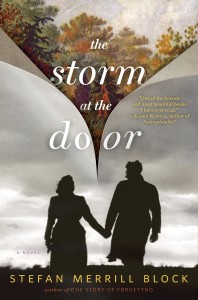 Synopsis:
Synopsis:
Katherine did not know Frederick very long before marrying him, and much of their courtship was conducted through letters exchanged while he was serving in the military during World War II. Before long, however, Frederick’s erratic behavior came to everyone’s attention and Katherine could not ignore it. Still, they had significant periods of happiness and their marriage produced four daughters, one of whom, Susie, serves as the story’s narrator.
By 1962, Frederick’s fragile mental state is further threatened by his heavy drinking. Following a cocktail party, Frederick acts out in a manner that comes to the attention of local law enforcement. Rather than face a potential criminal charge, a deal is struck: Frederick will be committed to Mayflower Home, a well-known mental institution, for what both he and Katherine believe will be a short stay. He will undergo therapy, but be back at home quickly and able to put the unpleasantness of that evening behind him.
Unfortunately, the terms of Frederick’s commitment dictate that he will not be released until the chief psychiatrist at Mayflower deems him ready to return home.
Meanwhile, Katherine is left to raise their daughters and manage her household on her own. With no income, she is dependent upon her father for financial assistance. As the days stretch into weeks and then months, her circumstances grow increasingly desperate.
Review:

The book’s focus shifts between Frederick’s experiences in Mayflower and what is happening back home to Katherine. In the early 1960’s, mental disabilities were viewed much differently than today. So the story is a fascinating glimpse at the manner in which the patients at Mayflower were dealt with by their treating physicians and staff, told convincingly as a result of Block’s extensive research on the topic. Several of Frederick’s fellow patients figure prominently in the story, their histories and destinies revealed in emotive detail. Frederick fights to maintain the cognitive clarity that is stolen from him by the drugs the staff force him to ingest each morning and afternoon. He tries to write in his journal without much success due to the haze that overtakes him after he has been medicated. The conditions at Mayflower bring into question whether the treatment provided can ever actually improve the patients’ conditions or if their institutionalization merely aggravates their compromised mental states. At first, he tries to find something beautiful and artistic in his predicament. But as more and more time passes and he is still not released, Frederick watches his fellow patients succumb either to their own mental disabilities, their circumstances or a combination thereof, and questions whether he can survive and return to the wife and family that are dimming in his memory.
The loss of my grandparents -– particularly the loss of my grandfather, whom I never met — has always haunted me. Since I was a kid, I’ve been imagining my grandparents; they were my first fictional characters. This book came out of an urgency I have always felt, the need to know them.~ Author Stefan Merrill Block
Meanwhile, Katherine copes with the couple’s daughters and attempts to maintain some semblance of normalcy for them, despite their father’s absence. She longs for her husband and the closeness they once shared, and ponders whether they will ever know such intimacy again. She contemplates which man is the real Frederick — the one she fell in love with or the one who now resides in an institution that will not allow her to visit him. Katherine was complicit in the plan to have Frederick committed for a short while in order to avoid the legal consequences of his conduct, spurred on by her family members who had long suspected that Frederick needed treatment. The longer Frederick remains confined at Mayflower, the more Katherine questions the wisdom of her decision and if her own behavior has in any way contributed to Frederick’s difficulties.
Eventually, Frederick is able to write to Katherine and, through the machinations of a rebellious staff member, his words reach Katherine. It is then that Katherine musters the courage to tangibly demonstrate her enduring love for her husband and fight for her family.
The Storm at the Door is a poignant, often heartbreaking look at the manner in which mental disabilities were handled in the 1960’s, as well as the impact that a family member’s mental disability can have upon that family for many decades and generations. It is a parallel study of the enduring and often mysterious love and loyalty that can hold a marriage together through turbulent, trying times. The story is obviously a loving homage to his own grandparents and their struggles, two people that he says “continue to feel so present in my family and in my own life . . . ”
Block’s prose is lushly descriptive, evoking vivid imagery and characterizations, described by some reviewers as “lyrical.” It is an intensely personal and mesmerizing look at one fictional family’s journey and legacy.
Enter to Win a Copy of The Storm at the Door
One lucky reader, selected at random, will receive a copy of The Storm at the Door, graciously provided by the author.
To enter, simply post a comment! Be sure to include your email address (for notification and delivery purposes). The book can only be shipped to a United States or Canadian address (no P.O. box).
The comment posted by Kimberly Maloney at Historical Fiction Obsession was selected at random, so a copy of The Storm at the Door was sent to Kimberly.



39 Comments
Looks like a great read!
This sounds like a great book. I am eager to read it.; Thank you!
sassysasha817 at gmail dot com
This book sounds like an amazing read and I would love to win it.
I’d love to be able to have imaginary grandparents. A couple of mine were a bit unusual!
meredithfl at gmail dot com
I am definitely interested in this one!
kimbers10[at]yahoo[dot]com
I would love to read it, it sounds really good.
twoofakind12@yahoo.com
I’m intrigued by the family connection that the author drew his story from – I’d read it for that reason alone!
Thanks for being a part of the tour.
Wow! This sounds like a great read! Thanks for the opportunity to win it!
jesse.nicole.paul (at) gmail (dot) com
Awesome! Thanks for the chance to win!
thegirlonfire27 at gmail dot com
Now that I am a grandparent I would be most interested in reading this. Always looking for books. Love to read. Thanks for the wonderful giveaway
This is such an intriguining novel! I love the concept behind the letters. I would love to read and review this. edysicecreamlover18ATgmailDOTcom
Looks like a fascinating book. Thanks for the giveaway.
I’ll be honest at first glance this one didn’t interest me but I thought I’de give it a second try. It sounds like a really god story! Thanks for the giveaway!
Margaret
singitm@hotmail.com
I enjoyed his book The Story of Forgetting and would love to read this one too.
Hey! Thank you so much for this giveaway! It sounds like a great book.
Sounds like a good read. Thanks for the giveaway!
mamabunny13 at gmail dot com
Would love to win this-thanks for the giveaway!
Please enter me I would love to win it. My Step Dad was taken to an institution while drinking when I was only 18, they let him check himself back out after 3 days. They didn’t help him at all. My brothers, sisters and I were all terribly upset because we thought he would finally get help with his drinking problem.
I cannot wait to read this book! I love historical fiction and am currently reading another new book (Next To Love by Ellen Feldman) dealing with the change in people and relationships after WWII. Thanks for the chance to win a copy!
I am intrigued. Thanks for the opportunity.
thanks for the chance to read this novel 🙂
Sounds like an interesting read.
Best wishes and thanks for a chance to win this fantabulous giveaway!
Chanticlear1(at)gmail(dot)com
This looks like a very intriguing story. I would love a chance to win. Thank you so much. 🙂
thriftyways(at)gmail(dot)com
I’d love to read this!
shana
Shanaelyse@gmail.com
I really want to read this one. Count me in please 🙂
quixoticdreamer(at)hotmail(dot)com
Would love to win!
This book sounds amazing. I would love to read it.
hootowl1978 at gmail dot com
I find this very interesting book to read. So unique even the way how it is written. From factual stories to wholly make it fictional. I can’t imagine how the author very well use much words to come up a good book like this. It’s great! =)
Sounds great! Please count me in. Thank you!
nfmgirl AT gmail DOT com
Pingback: Blog Tour & Giveaway: Storm at the Door by Stefan Merrill Block
Would love to read this – am particularly fond of the time setting before & after WW2. Thanks for the chance.
debbie AT exurbanis (DOT) com
I would love to read this. I must put it on my wishlist!
What a wonderful story, it seems to bring to light so many things around us that we never really stop to consider in our dealings with others. Thank you for sharing today and for the wonderful giveaway opportunity.
dz59001[at]gmail[dot]com
This would be a wonderful followup to a book I just finished: Annie’s Ghost.
Sounds like a great read!
nicnac63 (at) hotmail (dot) com
The book sounds wonderful!
Pingback: Stefan Merrill Block, author of The Storm at the Door, on tour June/July 2011 | TLC Book Tours
Pingback: “The Storm at the Door” by Stefan Merrill Block | Melody & Words
This is a book that sounds like its well worth reading . Enter me please
amhengstATverizonDOTnet